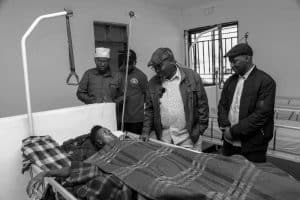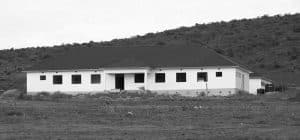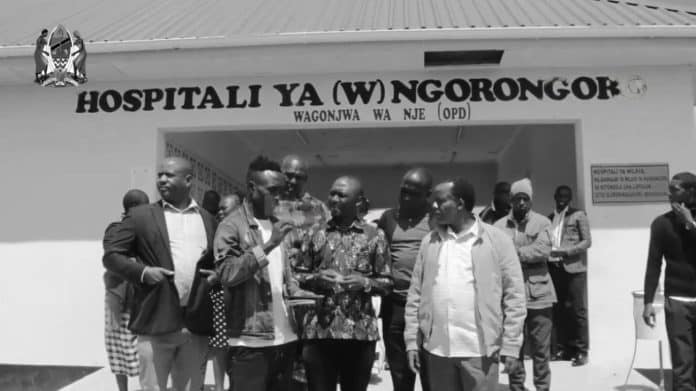Introduction to Ngorongoro Hospital
Nestled in the heart of the Ngorongoro Conservation Area, Ngorongoro Hospital stands as a beacon of hope, providing essential healthcare services to the diverse communities that call this region home. As a vital institution in the Cradle of Humanity, Ngorongoro Hospital has dedicated itself to improving the well-being of the local population, ensuring that all individuals have access to quality medical care, regardless of their background or economic status.
Ngorongoro: The Cradle of Humanity

Ngorongoro is a unique and awe-inspiring region, renowned for its breathtaking natural beauty and its profound historical significance. This UNESCO World Heritage Site is home to the Ngorongoro Crater, a vast, ancient caldera that has been a hub of human activity for millions of years. It is within this remarkable landscape that Ngorongoro Hospital operates, serving as a vital link between the past and the present, and ensuring that the communities of the Cradle of Humanity have access to the medical care they need to thrive.
The Importance of Healthcare in Ngorongoro
The Ngorongoro Conservation Area is home to a diverse array of communities, each with its own unique cultural traditions and healthcare needs. From the pastoral Maasai people to the indigenous Hadzabe hunter-gatherers, the residents of this region face a range of challenges that can only be addressed through comprehensive and accessible healthcare services. Ngorongoro Hospital has recognized the vital importance of providing quality medical care in this dynamic and culturally rich environment, and has dedicated itself to meeting the evolving needs of the local population.
Services and Facilities at Ngorongoro Hospital
Ngorongoro Hospital is a modern, well-equipped medical facility that offers a wide range of services to the local community. From primary care to specialized treatments, the hospital’s dedicated staff of physicians, nurses, and support staff work tirelessly to ensure that every patient receives the attention and care they deserve. The hospital’s facilities include:
- Emergency Department: Providing 24/7 emergency care for a wide range of medical emergencies, from trauma to acute illness.
- Outpatient Clinic: Offering comprehensive primary care services, including routine check-ups, vaccinations, and the management of chronic conditions.
- Maternity Ward: Specializing in prenatal care, delivery, and postnatal support, ensuring the health and well-being of mothers and their newborns.
- Surgical Suite: Equipped with state-of-the-art medical equipment, the hospital’s surgical suite offers a range of procedures, from minor outpatient surgeries to more complex operations.
- Diagnostic Imaging: Featuring advanced imaging technologies, such as X-ray, ultrasound, and CT scanning, to provide accurate and timely diagnoses.
- Pharmacy: Stocked with a wide array of essential medications, the hospital’s pharmacy ensures that patients have access to the treatments they need.
Community Outreach Programs by Ngorongoro Hospital
Ngorongoro Hospital recognizes that its role extends far beyond the walls of the hospital itself. The institution has implemented a comprehensive community outreach program, designed to bring essential healthcare services directly to the people of the Ngorongoro Conservation Area. These initiatives include:
- Mobile Clinics: Traveling to remote villages and settlements, the hospital’s mobile clinics provide basic medical care, health screenings, and education to those who may have limited access to the hospital.
- Health Education Workshops: Ngorongoro Hospital organizes regular workshops and seminars, covering a range of topics such as disease prevention, maternal and child health, and nutrition, empowering the local community to take an active role in their own well-being.
- Vaccination Campaigns: Partnering with local authorities and international organizations, the hospital spearheads large-scale vaccination drives, ensuring that the residents of Ngorongoro are protected against preventable diseases.
- Chronic Disease Management: Recognizing the growing burden of non-communicable diseases, Ngorongoro Hospital has developed specialized programs to support individuals living with conditions such as diabetes, hypertension, and HIV/AIDS.
Challenges Faced by Ngorongoro Hospital
Despite its unwavering commitment to serving the community, Ngorongoro Hospital faces a number of significant challenges in its mission to provide quality healthcare. The remote and rugged nature of the Ngorongoro Conservation Area, coupled with the region’s limited infrastructure, can often make it difficult to access and transport essential medical supplies and equipment. Additionally, the hospital must contend with the unique cultural and linguistic diversity of the local population, requiring a deep understanding and sensitivity to ensure that all patients receive the care they need.
Furthermore, Ngorongoro Hospital operates in a resource-constrained environment, where funding and financial support can be scarce. The hospital’s leadership must constantly navigate these challenges, seeking innovative solutions and strategic partnerships to ensure the continued provision of essential medical services.
Partnerships and Collaborations in Ngorongoro Healthcare

To address the multifaceted challenges it faces, Ngorongoro Hospital has forged strong partnerships and collaborations with a range of organizations, both local and international. These partnerships have been instrumental in expanding the hospital’s reach and capabilities, allowing it to deliver more comprehensive and effective healthcare to the communities it serves.
Some of Ngorongoro Hospital’s key partnerships include:
- The Ngorongoro Conservation Area Authority (NCAA): Collaborating closely with the local governing body, Ngorongoro Hospital works to align its services with the region’s broader healthcare priorities and initiatives.
- International NGOs and Charitable Organizations: Ngorongoro Hospital has established fruitful partnerships with various non-profit organizations, securing funding, resources, and technical expertise to enhance its service delivery.
- Academic and Research Institutions: By collaborating with universities and research centers, Ngorongoro Hospital is able to stay at the forefront of medical advancements, while also contributing to the advancement of healthcare knowledge in the region.
- Private Sector Partnerships: The hospital has cultivated relationships with private companies and businesses, leveraging their resources and expertise to improve infrastructure, procurement, and operational efficiency.
These strategic partnerships have been instrumental in enabling Ngorongoro Hospital to overcome the unique challenges it faces, ensuring that the communities of the Cradle of Humanity have access to the high-quality healthcare they deserve.
Future Plans and Expansion of Ngorongoro Hospital
As Ngorongoro Hospital continues to grow and evolve, the institution has set its sights on a bold and ambitious future. Drawing on the lessons and experiences of the past, the hospital’s leadership has developed a comprehensive strategic plan that aims to expand its reach, enhance its services, and deepen its impact on the local community.
Key elements of Ngorongoro Hospital’s future plans include:
- Facility Expansion: The hospital intends to invest in the construction of new, state-of-the-art medical facilities, allowing it to accommodate a growing patient population and offer a wider range of specialized services.
- Technological Advancement: By embracing the latest medical technologies, Ngorongoro Hospital aims to improve the accuracy and efficiency of its diagnostic and treatment capabilities, ensuring that patients receive the most effective care possible.
- Workforce Development: The hospital recognizes the crucial role of its staff in delivering high-quality healthcare. As such, it is committed to investing in the training and professional development of its physicians, nurses, and support personnel, ensuring that they are equipped to meet the evolving needs of the community.
- Community Engagement: Ngorongoro Hospital plans to further strengthen its community outreach programs, leveraging innovative approaches and strategic partnerships to bring essential healthcare services to even the most remote and underserved areas of the Ngorongoro Conservation Area.
- Sustainable Funding: Recognizing the importance of financial stability, the hospital is exploring new and innovative funding models, including social impact investments and public-private partnerships, to ensure the long-term viability of its operations.
By implementing these ambitious plans, Ngorongoro Hospital aims to solidify its position as a leading healthcare institution in the Cradle of Humanity, serving as a beacon of hope and a catalyst for positive change in the lives of the people it serves.
Supporting Ngorongoro Hospital: How You Can Help
Ngorongoro Hospital’s mission to provide comprehensive and accessible healthcare to the communities of the Ngorongoro Conservation Area cannot be achieved alone. The hospital relies on the support and generosity of individuals, organizations, and partners from around the world to continue its vital work.
There are several ways in which you can contribute to the success and sustainability of Ngorongoro Hospital:
- Financial Donations: Your monetary contributions, whether large or small, can make a significant difference in the hospital’s ability to purchase essential medical equipment, fund community outreach programs, and expand its facilities to better serve the local population.
- Volunteer Opportunities: Ngorongoro Hospital welcomes volunteers from diverse backgrounds, including healthcare professionals, administrative staff, and community advocates, to lend their skills and expertise to the hospital’s operations.
- In-Kind Donations: The hospital is always in need of medical supplies, equipment, and other resources. By donating these items, you can directly support the hospital’s ability to provide high-quality care to its patients.
- Advocacy and Awareness: By sharing Ngorongoro Hospital’s story and mission with your friends, family, and community, you can help raise awareness and garner additional support for the hospital’s vital work.
- Collaborative Partnerships: Individuals and organizations with specialized expertise or resources can explore opportunities to partner with Ngorongoro Hospital, leveraging their unique capabilities to enhance the hospital’s impact and reach.
Conclusion: Ngorongoro Hospital’s Impact on the Community
Ngorongoro Hospital stands as a shining example of the transformative power of healthcare in the Cradle of Humanity. By providing essential medical services, promoting preventive care, and empowering local communities, the hospital has become a beacon of hope and a catalyst for positive change in the Ngorongoro Conservation Area.
Through its unwavering commitment to serving the diverse needs of the local population, Ngorongoro Hospital has not only improved the physical well-being of its patients but has also fostered a deeper sense of community and resilience. As the hospital continues to evolve and expand its reach, it remains steadfast in its mission to ensure that every individual in the Ngorongoro region has access to the quality healthcare they deserve, ultimately contributing to the betterment of the Cradle of Humanity.
For more articles related to Hospitals in Tanzania, click here

































